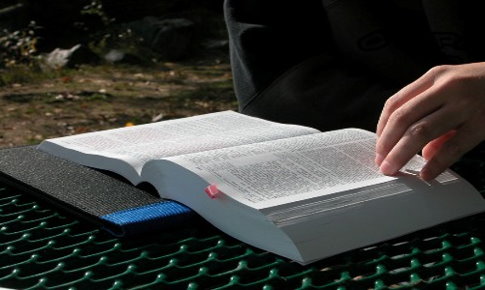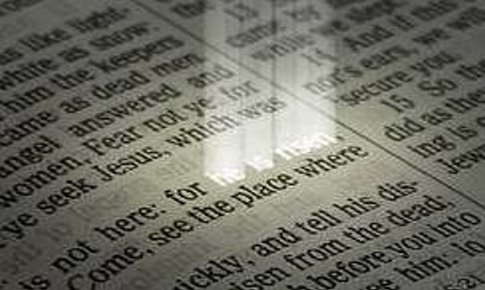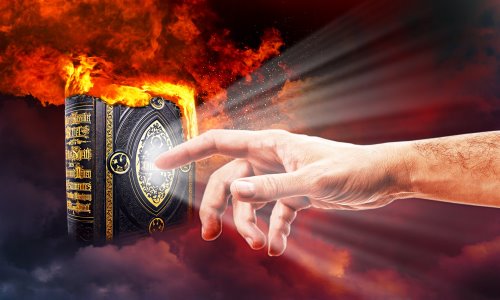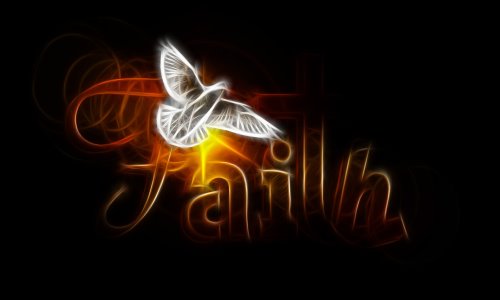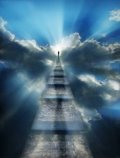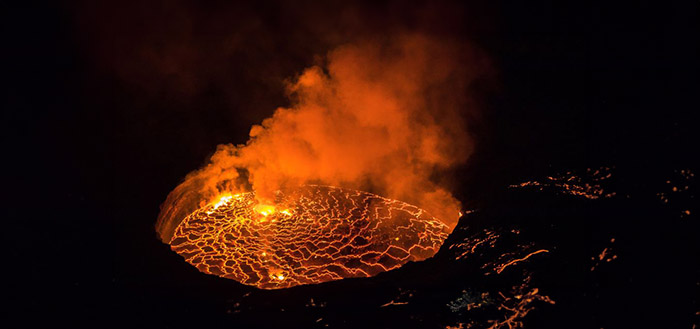
Revelation 20:14
And death and hell were cast into the lake of fire. This is the second death.
Why a "lake" of fire? Of the commentators we have consulted, none make any reference to this particular word, its meaning, and the reason for its use. The Greek word translated as "lake" is limne. Parkhurst says that the word indicates a lake of standing water, as opposed to a running stream, and is so called from lian menein, "remaining very quiet"; so the Latin, stagnum, a pool. Schrevelius reads limne, a port, harbor, haven, station, refuge, accusative limena; as if lian menei, because there the ships rest safely; hence limenarches, a harbor master. Limne occurs in the LXX in Psalm 107:30, "haven," Psalm 107:35; Psalm 114:8, "a standing water," Song of Solomon "fish pool" (Song. 7:4). The word occurs in the N.T. ten times and is always translated "lake." Apart from the five references in the Revelation, the remainder occurs in Luke 5:1-2, Luke 8:22-23, Luke 22:33, the lake of Gennesaret, elsewhere called the Sea of Galilee, and the sea and lake of Tiberias, and in the O.T., the sea of Chinnereth.
In Luke 8:22-23 "the lake" is associated (1) with the storm that threatened the lives of the disciples, and which the Saviour "rebuked," and (2) the place where the swine, possessed of demons, were choked. In every place, a lake of water is intended, which makes it strange that a "lake of standing water, a haven, and a harbor" should burn with "fire and brimstone." There is only one other set of references that may have some bearing, and these are found in the Apocrypha.
Difficult as it may be for us to understand, at the sounding of the sixth trumpet, four angels are let loose, which had been bound in the great river Euphrates (Rev. 9:14). How could a river hold angels? In the article entitled "The Bottomless Pit," we show the connection that exists in Scripture between "The Abyss", "The Sea," and "The Deep" of Genesis 1:2. That connection must be kept in mind here. In the 2nd book of the Maccabees, 12:1-9 we have the following record:
"The men of Joppe also did such an ungodly deed; they prayed the Jews that dwelt among them to go with their wives and children into that which they had prepared, as though they meant them no hurt, who accepted of it according to the common decree of the city as being desirous to live in peace, and suspecting nothing: but when they were gone forth into the deep, they drowned no less than two hundred of them.
When Judas heard of this cruelty done unto his countrymen, he commanded those that were with him to make them ready. And calling upon God the righteous Judge, he came against those murderers of his brethren, and burnt the haven ("lake") by night, and set the boats on fire, and those that fled thither (or from the fire) he slew. But when he heard that the Jamnites were minded to do in like manner.. he came.. and set fire on the haven and navy, so that the light of the fire was seen at Jerusalem two hundred and forty furlongs off."
We Gentiles have never had impressed upon our hearts, minds, and memory the exploits of the Maccabees. Were we to have had a revelation written especially for English-speaking people, it might use a mixture of figures; it might speak of a fat boy carved in stone, a monument in New York Harbor, and refer to Cheese Burgers and Fries, and the sin of gluttony; but it is very unlikely that a Chinese reader, or come to that, some readers nearer home, would make sense of this oblique reference to the great San Francisco fire! So, the essentially Hebrew atmosphere of the Book of Revelation not only draws freely upon Old Testament imagery but contains an allusion to uncanonical or traditional happenings that may never find a place in a respectable commentary written for English readers. It may be that the "lake" of fire, before the Judgment of that day, had been a "haven" for those evil beings, the Beast and the False Prophet, and it had been "prepared for the Devil and his angels" as the place of their final destruction. Nothing definite can be adduced from what we have presented, but we have at least given the term employed something more than a casual glance.
We have seen in Scripture the promise to the overcomer that such would not have their names blotted out of the Book of Life (Rev. 3:5). We must now devote some attention to the parallel promise given to the overcomer in the church of Smyrna: "He that overcometh shall not be hurt of the second death," and this second death, together with the Book of Life and the lake of fire, figures prominently in the Judgment of the Great White Throne (Rev. 20:11-15). The choice of the word "hurt" by the A.V. translators may have been influenced by such passages as "Lo, I see four men loose, walking in the midst of the fire, and they have no hurt" (Dan. 3:25). "So Daniel was taken up out of the den, and no manner of hurt was found upon him" (Dan. 6:23).
In contrast with the three who were not "hurt" in the furnace is the fate of the men who stoked the fire (Dan. 3:22), and in contrast with Daniel is the fate of those who accused him (Dan. 6:24). The word translated "hurt" in Revelation 2:11 is adikeo, which is so rendered in eight other passages in the Apocalypse, and twice translated "unjust" in Revelation 22:11. The overcomer in Smyrna, being a believer, had no need to be told that he would not be Cast into the lake of fire, but that he should not be "Hurt" by it, a different matter altogether. From what we have already seen, it will be recognized that a wider survey of the references to "fire" and its implications is called for. Matthew 5:22, coming in the Sermon on the Mount, has reference to disciples and not to the ungodly outside world. It is set in a form of progression, the penalty keeping pace with the offense thus:
"Whosoever is angry with his brother without a cause, shall be in danger of The Judgment: and Whosoever shall say to his brother Raca, shall be in danger of The Council: but Whosoever shall say, Thou fool, shall be in danger of Hell Fire."
The "Council" here is the Sanhedrin. Raca is a word like "empty-head," and "Hell Fire" here is Gehenna.
"But what was there more grievous in the word "fool" than in the word "Raca"? Let King Solomon be our interpreter, who, everywhere, by a "fool" understands a wicked and reprobate person, foolishness being opposed to spiritual wisdom. "Raca" denotes indeed, "morosity" and lightness of manners and life; but "fool" judgeth bitterly of the spiritual and eternal state" (Lightfoot).
While we can recognize a series of degrees in these actions and that they are accompanied by corresponding degrees of punishment, it still seems to be inexplicable that for saying raca, a man was amenable to the Sanhedrim, but for saying fool, the offender was in danger of "hell fire." Put into modern terms, we could read;
The first offense would be liable to a fine imposed by a magistrate. The second offense might lead to prison and a term of imprisonment.
The third offense to a punishment of inconceivable horror, far worse than that of being beheaded or hanged.
If we turn to Matthew 25, we shall face a similar problem. There, at the Second Coming, The Lord, the nations of the earth gather before Him, and they are judged on one issue only, namely, the way in which they have treated His "brethren."
In one section, The King says:
"Come, ye blessed of My Father, inherit the kingdom prepared for you from the foundation of the world" (Matt. 25:34).
To the other, The King says:
"Depart from Me, ye cursed, into everlasting fire, prepared for the devil and his angels" (Matt. 25:41).
The kindness shown to The Lord's brethren was not intentionally rendered to The Lord, as the astonished inquiry of Matt. 25:37-40 will show. The lack of kindness was not intentionally withheld from The Lord. Yet, one group goes "into everlasting life," which is equated with The Kingdom prepared for them from the foundation of the world. The other group goes "into everlasting punishment," which is equated with "everlasting fire prepared for the devil and his angels." Let us observe: the inheritance was actually prepared for one group, but the other entered a punishment not originally "prepared" for them but for the devil and his angels. If from these verses we are to gather that failure to visit the brethren of The Lord in prison merits everlasting punishment and everlasting fire in the sense of a traditional "Hell," then all argument is at an end. We stand appalled but helpless before a power beyond our own, but whether we stand assured of its utter and unquestioned righteousness, each one of us alone can answer. Before we leave these unhappy nations to their awful lot, would it not be well if we knew the word used by The Lord for "punishment" here? There is a choice of at least four words:
Ekdikesis "the punishment of evildoers" (1 Pet. 2:14).
Epitimia "suffered . . . is this punishment" (2 Cor. 2:6).
Timoria "sorer punishment" (Heb. 10:29).
These words are not found in Matthew 25. The word employed there is kolasis, "a pruning" (Dr. Bullinger's Lexicon). The one other occurrence of kolasis is in 1 John 4:18, "torment." Kolazomai is translated as "punish" in Acts 4:21 and 2 Peter 2:9. The first meaning of kolazomai given in Liddle and Scott is "curtail, dock, prune," and secondly to castigate, keep within bounds, correct, punish. Kolasis is used with dendron "trees" in the sense of pruning. Turning to the usage of the word kolasis in the LXX, we read in Ezekiel 18:30, "I will judge you O house of Israel, saith the Lord, each one according to his way: be converted, and turn from all your ungodliness, and it shall not become to you the punishment of iniquity."
Again, in Ezekiel 44:12-14, The Levites, because of their departure and ministry of idols, became "a punishment" of iniquity to the house of Israel, with the consequences that these Levites could no longer draw near nor approach the holy things, but they shall bear their reproach (atimian "no honor" see usage in 2 Timothy 2:20-21) and take a lower service. This is understandable, but to translate the word kolasis as equivalent to everlasting torment in hell is impossible. Before concluding this matter in Matthew 25, let us get a little light by turning to Hebrews 6. It will, we trust, be conceded that for Israel to "crucify to themselves the Son of God afresh, and put Him to an open shame" is a deeper sin than neglecting to visit the Lord's brethren in prison. Yet, while there is reference to "burning" as a consequence, it is remedial.
"For the earth . . . which beareth thorns and briars is rejected, and is nigh unto cursing; whose end is to be burned" (Heb. 6:7-8).
The "earth" here is a piece of land under cultivation. The word "rejected" is adokimos, "disqualified" having failed the test, and it is not cursed, but "nigh unto" cursing. The burning, which is its end, burns up the "thorns and briars" but does not destroy the land itself but rather benefits it. It is comparable to the "pruning" of a tree. Suppose we allow the gentler meaning of the term in Matthew 25; then, in that case, the nations who failed will go away into an age-long pruning, thereby missing the glory of the Millennium but benefiting from its administration and correction.
Let us examine the Scriptures as to the usage of "fire" to indicate the Holiness and the Presence of God before we go further in our search.
Fire and the Holiness of God
"Our God is a consuming fire" (Heb. 12:29).
These words refer back to Deuteronomy 4:24 and Deut. 9:3. This fire turns both ways. Its flame scorches the covenant people who provoke the Lord to jealousy, and the flame destroys the enemies of His people. The association of fire with the presence of The Lord, irrespective of sin or wrath, is the burden of many references.
"The sight of the glory of the Lord was like devouring fire" (Exod. 24:17). This fire devoured Nadab and Abihu (Lev. 10:2) as it consumed the murmurers in Numbers 11:1. Deuteronomy 5 is full of references to this association of fire with the presence of the Lord, and in Ezekiel 8:2 fire is associated with the appearance of the Lord there.
"Who among us shall dwell with the devouring fire? who among us shall dwell with everlasting burnings?" asks Isaiah 33:14. God Himself is a consuming fire. It must follow that saved and lost must, if in that sacred Presence, alike be affected by its searching character, the believer being able to answer the challenge of Isaiah 33:14 "who shall dwell with everlasting burnings" because clothed in the asbestos (the Greek word is found in four passages) covering wherein they are accepted in The Beloved. This glorious immunity, being theirs, is found "in Christ," not having their own righteousness as a protection but the righteousness of God, which is by faith. These selfsame believers, however, who are thus immune from the searching flame of The Divine Presence may have with them and about them "works" which by their very nature cannot stand the test of fire and so are mercifully shriveled as they draw near. We must now pursue this aspect as it impinges eventually on the interpretation we must put upon the "lake of fire" in Revelation 20 and elsewhere. We have used the word asbestos in its modern meaning; in the N.T., it refers to the unquenchable fire, not to the nonburnable material (Matt. 3:12; Mark 9:43-45 and Luke 3:17).
Fire and the Redeemed
(Their perfect exemption, protection, and standing in Christ.)
Let us take the illustration found in Daniel 3. The overweening pride of Nebuchadnezzar left the three friends of Daniel no alternative but to disobey his commands, even though the consequence of disobedience was to be cast into a "burning fiery furnace." To ensure their destruction, Nebuchadnezzar commanded that the furnace be heated seven times more than was needed, and so vehement was its flame that the men who took up the faithful three were themselves instantly slain. But Shadrach, Meshach, and Abed-nego, though they "fell down bound" in the midst of such a fiery furnace, were seen walking unscathed together with one like unto the Son of God, and, as Nebuchadnezzar admitted, "they have no hurt." What is meant by having "no hurt" is made clear in Daniel 3:27:
"These men, upon whose bodies the fire had no power, nor was an hair of their head singed, neither were their coats changed, nor the smell of fire had passed on them."
That is what we meant when we used the word asbestos for the perfect immunity of the believer "in Christ." They are an anticipation of those who shall not be "hurt" by the second death. Isaiah assured the "redeemed" of this immunity when he wrote:
"When thou walkest through the fire, thou shalt not be burned; neither shall the flame kindle upon thee" (Isa. 43:2).
Just as we find Daniel pondering over the writings of Jeremiah (Dan. 9:2), we can readily believe that the three friends found all the encouragement they needed in the precious words of Isaiah 43:2 when facing the ordeal of fire set by Nebuchadnezzar.
Again, as space is limited, we have no need to "prove" to the Spirit-taught believer this blessed position of complete immunity demonstrated by Daniel 3 and prominent in Isaiah 43 as being equally true of all believers. We, therefore, turn our attention to the second division of this aspect of truth.
Fire and the Redeemed
(The test of faith and of works).
"The trial of your faith, being much more precious than of gold that perisheth, though it be tried with fire, might be found unto praise and honour and glory at the appearing of Jesus Christ" (1 Pet. 1:7).
Here, it is not salvation that is under the test; it is the "trial of faith." The Greek words dokimion, "trial," and dokimazo "tried" have reference to the testing of metals; indeed, the LXX of Proverbs 27:21 uses dokimion to translate the word "a fining pot" or a "crucible," and Job said, "When He has tried me, I shall come forth as gold" (Job 23:10). Peter again speaks of "the fiery trial" that was about to try some of his readers (1 Pet. 4:12). Paul writing to the Corinthians makes it very clear, that those who are building upon the One Foundation, namely Christ, while never in danger of "being lost," might "suffer loss" as over against "receiving a reward," and uses the trial by fire to illustrate his teaching.
"Now if any man builds upon this foundation gold, silver, precious stones, wood, hay, stubble; every man's work shall be made manifest: for the day shall declare it, because it shall be revealed by fire; and the fire shall try every man's work of what sort it is. If any man's work abides which he hath built thereupon, he shall receive a reward. If any man's work shall be burned, he shall suffer loss; But He Himself shall be saved; yet so as by fire" (1 Cor. 3:12-15)
Here, "works" are in view, and "works" only. When examining the character of the Millennium, we drew attention to the words of The Saviour to the seven churches, "I know thy works," and how they were linked with Revelation 20:12, "The dead were judged... according to their works." First, to every one of the seven churches, the Saviour said, "I know thy works," and so dominant is this reference to "works" in these two chapters (Rev. 2 and 3) that we find the Greek word ergon occurring fourteen times. It is to one of these churches made up of the redeemed that the overcomer (Rev 2:11), a promise fulfilled in Revelation 20:6, for there those who "reign" with Christ for the thousand years are said to be blessed and holy; they are said to be priests of God and of Christ, and "On Such the second death hath no power."
Every one of these seven churches is linked with the Millennial Kingdom by either the promise to the overcomer, the warning to the slacker, or both. Let us see this for ourselves.
Ephesus Promise Paradise . . . Rev. 2:7 and Rev. 22:2
Smyrna Promise Not hurt of the second death . . . Rev. 2:11 and Rev. 20:6.
Pergamos Promise New name . . . Rev. 2:17 and Rev. 19:12
Threat Fight, sword, mouth . . . Rev. 2:16 and Rev. 19:15
Thyatira Promise Rod of Iron . . . Rev. 2:27 and Rev. 12:5
Threat Kill with death . . . Rev . . . 2:23 and Rev. 20:15
Sardis Promise Not blot out . . . Rev. 3:5 and Rev. 20:12.
Philadelphia Promise New Jerusalem . . . Rev. 3:12 and Rev. 21:2
Laodicea Promise Sit in Throne . . . Rev. 3:21 and Rev. 20:4
If "the second death" be the doom that awaits the wicked dead, what congruity is there between the Position "priests of God and of Christ" and the Promise "on such the second death hath no power" (Rev. 20:6)? Anyone with the slightest knowledge of The Gospel of Grace, knows that "there is. . . no condemnation" possible for the believer in Christ. Now, this second death is equated with "the lake of fire" (Rev. 20:14-15) and so falls within the bounds of our present inquiry. This "lake of fire" is mentioned in five passages in Revelation and in several other passages by implication.
"The beast was taken, and with him the false prophet that wrought miracles before him, with which he deceived them that had received the mark of the beast, and them that worship his image. These both were cast alive into a lake of fire burning with brimstone" (Rev. 19:20).
"And the devil that deceived them was cast into the lake of fire and brimstone, where the beast and the false prophet are (or were), and shall be 'tormented day and night for ever and ever" (Rev. 20:10).
"And death and hell were cast into the lake of fire. This is the second death" (Rev. 20:14).
"And whosoever was not found written in the book of life was cast into the lake of fire" (Rev. 20:15).
"He that overcometh shall inherit all things . . . but the fearful . . . shall have their part in the lake which burneth with fire and brimstone: which is the second death" (Rev. 21:7-8).
The first thing we must note is that in Revelation 21, the doom of those spoken of in Rev. 21:8 is said to be exclusion from the heavenly Jerusalem (Rev. 21:27). Let us make sure of this.
"But the fearful, and unbelieving, and the abominable, and murderers, and whoremongers, and idolaters, and all liars, shall have their part in the lake which burneth with fire and brimstone: which is the second death (Rev. 21:8).
"And there shall in no wise enter into it anything that defileth, neither whatsoever worketh abomination or maketh a lie: but they which are written in the Lamb's book of life." (Rev. 21:27).
Someone who was timid, who had flinched under the dreadful persecution of the time of the Beast and False Prophet--this one who fell and against which sin Paul even warned Timothy (2 Tim. 1:7), he has his part in the "lake of fire," whereas anyone that was defiled was excluded from the Heavenly Jerusalem. Yet this, while it sounds odd enough, will be seen more strange for in one verse, the abominable and "All" liars are destined for the "lake of fire," while in the corresponding verse, "Anything . . . that worketh abomination, or maketh a lie," is excluded from the Heavenly Jerusalem. Surely, if the Scriptures are inspired, this means that the reference to the "lake of fire," the reference to the "second death," the reference to the "Book of Life," and the reference to the entry into the "Heavenly City" are to be read together. This "lake of fire" is said to have been "prepared" for the devil and his angels (Matt. 25:41) in contrast with The Kingdom that had been "prepared" for those who received The Lord's commendation (Matt. 25:34); the "Bride" also is prepared for her husband (Rev. 21:2). In each case they are exceptional, and cannot be spread wider than the contexts will allow. This dreadful "lake of fire" had not been "prepared" for any other than the Devil and his angels, but if anyone yielded to the pressure or the temptation of the last days so as to ally himself with the Devil and his emissaries, he could be "hurt" of the second death, he would find that the fire that destroyed the enemy, could also burn up his fleshly "works," and he could "suffer loss" even the loss of the Heavenly City, yet "he himself could be saved so as by fire."
Closely connected with all this is the question, to what does the Book of Life refer? Does it speak of the redeemed or a special company from among the redeemed? Let us see. For our present study, we shall attempt no distinction between the Greek words biblion, a little book, and biblos, a book. The first reference is found in Philippians 4:3, which relates to service. Had the Book of Life appeared in Ephesians and Colossians, we might have thought that it was tantamount to the choice of the believer before the foundation of the world, but Philippians is the Epistle of service. It opens with a reference to bishops and deacons, and it urges the believer to "work out" his salvation; it holds out a "Prize" and even tells us that the Apostle Paul, who was sure of his Salvation and Hope, was not at the time as sure of the Prize as he was at the end of his course (Phil. 3:11-14 and 2 Tim. 4:7-8).
Earlier in Philippians, Epaphroditus "was nigh unto death, not regarding his life" in service to the Lord, and Paul himself had taken the view of life: "Christ shall be magnified in my body, whether by Life or by Death." It is, therefore, fitting that those who thus lost their lives for Christ's sake should find them in this Book of Life, the book of martyred saints who, in their several spheres, will "reign" with Christ. This passage in Philippians is the only reference in the N.T. to the "Book of Life" except those found in the Book of Revelation. Now, the Book of Revelation traces the career of the over-comer throughout the great tribulation to the throne, and it is this Book that contains all the other references to the Book of Life.
"I will not blot out his name out of the book of life" (Rev. 3:5).
"And all that dwell upon the earth shall worship him (the Beast), whose names are not written in the book of life of the Lamb slain from the foundation of the world" (Rev. 13:8).
"And they that dwell on the earth shall wonder, whose names were not written in the book of life from the foundation of the world" (Rev. 17:8).
"And I saw the dead (i.e., "the rest," Rev. 20:5), small and great, stand before God, and the books were opened: and another book was opened, which is the book of life" (Rev. 20:12).
"And whosoever was not found written in the book of life was cast into the lake of fire" (Rev. 20:15).
"And there shall in no wise enter into it anything that defileth, neither whatsoever worketh abomination or maketh a lie: but they which are written in the Lamb's book of life" (Rev. 21:27).
"And if any man shall take away from the words of the book of this prophecy, God shall take away his part: (1) out of the book of life, and (2) out of the Holy City, and (3) out from the things written in this book" (Rev. 22:19).
Some authorities read "The Tree of Life" here. While the margin of the R.V. reads in Revelation 13:8, "written from the foundation of the world in the book . . . slain," it still retains in the text the order "in the book of life of the Lamb slain from the foundation of the world," and this should give us pause, lest in sweeping aside a difficulty, we also remove an index of its meaning. By referring to Luke 11:50-51 we shall see that "the blood of Abel" was the first to be "shed from the foundation of the world," and this suggests that the "Lamb's book of life" contains the names of all those who have suffered martyrdom for the faith since the first martyrdom of Abel. Incidentally, this reference disposes of the suggestion that "before the foundation of the world" refers to the future, for if we go back as far as Genesis 4, for the period "from" the foundation of the world, the period indicated in Ephesians 1:4 Must be earlier still. Abel especially sets forth the conditions we find ruling in Revelation, for it was Cain, who was of "that wicked one," the seed of the serpent (Gen. 3:15), that shed the first martyr's blood. It is the Dragon, "that old Serpent", the Beast, the False Prophet, and their followers who shed the blood of the overcomers in the time of the end.
"And they overcame him
(1) by the blood of the Lamb,
(2) and by the word of their testimony;
(3) and they loved not their lives unto the death" (Rev. 12:11).
and at the end of the chapter, we see the Dragon makes war with the remnant of the woman's seed, which keep the commandments of God and have the testimony of Jesus Christ (Rev. 12:17).
We have already referred to those who apostatize on the day of Tribulation, who draw back unto perdition, who "fall away" and crucify to themselves the Son of God afresh, who are likened to the earth which produces thorns and briars and is (1) "rejected," is (2) "nigh unto" cursing, (3) whose end is to be "burned" (Heb. 6:6-8). Now "rejected" is the Greek word adokimos, derived from a word which means to test or to try a metal. Peter uses it for the "trial" of faith and of the unashamed workman "approved" by Paul. Adokimos is the word translated as "castaway" in 1 Corinthians 9:27, meaning "disqualified" so far as the "crown" is concerned. "Nigh" unto cursing is not the same as being actually cursed, even as Bethany was "nigh" unto Jerusalem but actually two miles distant. When a field that is full of weeds is "burned," the weeds are destroyed, but the field abides and is the better for it.
Enough, we believe, has been brought before the reader to enable him to see that the Book of Revelation deals with a particular class and calling; its terms of judgment, although awful, are limited by their contexts and taken with the alternative of reigning and overcoming, cannot be lifted out of these contexts and applied to the believer of the present dispensation, or to the ungodly and un-evangelized world of all ages. To be "nigh" unto cursing, to be "hurt" of the second death, to have one's name "removed" from the Book of Life, which apparently contains the names of all overcomers since the death of Abel, to be "excluded" from the heavenly city, all pertain to the people of God who find themselves in the dreadful three and one-half years of the domination of the beast, and which give us a picture of the Millennial reign, that must be retained. Let us rejoice that there will be some who will endure that time of terror and who will consequently "Live and reign with Christ a thousand years."








